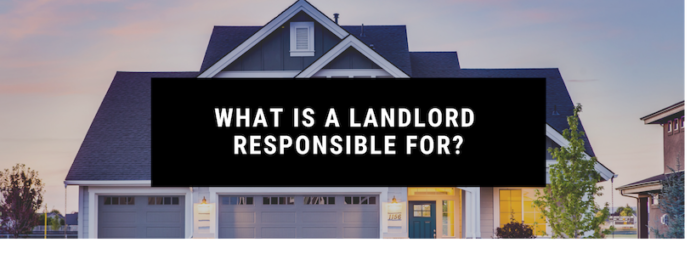As there are now more people renting than ever before, if you want to be a landlord, there’s never been a better time.
Knowing what is a landlord responsible for and what they’re not is vital to being a good and fair landlord who people like. The requirements for landlords vary from place to place but there are some basics that persist.
Here are five things that a landlord is almost always responsible for.
1. Basic Building Safety
Every locality is different, but in most places, landlords are responsible for basic building safety. When it comes to ensuring that nothing is falling from the ceiling, nothing from the facade is crumbling, and the foundation is secure, that’s up to the landlord.
Tenants aren’t required to inspect the building or to check on whether the ground a building on is stable.
From time to time, most cities and states have building inspectors performing random inspections. They’ll drop in to check on wiring, fire safety, or the general stability of the building itself. They have the right to stop by unannounced and, if they find anything, it’s up to the landlord to fix the problems.
In some cases, a building can be in such a poor condition that the city or state could order that the tenants vacate the building. In these cases, it could be the landlord’s responsibility to cover the housing costs for everyone displaced.
If a building is too dangerous to stay in, then that’s the landlord’s fault for being behind on safety and repairs. The basic elements of the building are the landlord’s responsibility.
2. Tenant Safety and Security
Beyond the structural elements of the building, it’s up to the landlord to make sure that each unit in the building has some basic security elements. In a large apartment building, the landlord needs to maintain any locks or security elements they have in place. If residents rent a place hoping that it’s secure and easy to lock up, then whatever conditions that they’ve expected need to be maintained.
On top of that, residents have the right to be safe from other tenants. The landlord should perform reasonable screening to ensure that no one unsafe is allowed in the building. If a tenant has a record of performing burglaries, the landlord should let the other tenants know, or better yet, not rent to that person.
If there’s a tenant who has a violent outburst or threatens another tenant, it’s vital for them to mediate the situation between tenants. Leaving the threatened tenant to fend for themselves is irresponsible and unfair. They have no authority over the situation and shouldn’t have to feel unsafe in their home.
When tenants feel unsafe because of something outside of their control that could be managed by the landlord, the landlord should step in. If it’s as simple as fixing a lock or a camera in a hallway, then it’s their financial responsibility.
3. Major Repairs
Tenants can be expected to handle light bulbs, basic cleaning tasks, and worrying about a few ants in the kitchen. However, if things grow out of hand, that’s up to the landlord, not the tenants.
If a lightbulb in a hallway goes out or a hard to reach lamp that uses a special bulb bursts, that’s up to the landlord to fix. They’re expected to manage the smoke alarms, bulbs, and elements that make it safer to get around the building. If something is defective on the stairwell or in the elevator, that’s up to the landlord to fix.
If someone spills a soda in the hallway, they should probably clean it up, but that’s not always going to happen. Those common spaces that everyone uses need to be maintained by the landlord. If a renter finds that there’s serious mold from the ceiling or between the walls of their unit, that’s up to the landlord to fix.
Pest control is another area where the landlord needs to step in. Just because someone noticed a bug one time, that doesn’t mean there’s a crisis. However, if you want to ensure small issues don’t turn into major ones, call in an exterminator to look around.
4. Insuring the Property
Property insurance is vital for most landlords. If a tenant or a stranger slips and falls on the stairs, they’re due some compensation for their pain. However, as long as the landlord has liability insurance, they don’t have to worry about paying out of pocket.
Insuring property is vital to protect both parties no matter what happens. It also means that the fault doesn’t fall on the backs of tenants for no good reason.
The property should be insured so that it’s protected in the case of a climate event. As climate events get more intense and happen more often, it’s vital that landlords protect their buildings against flooding, fires, or any kind of extreme storm. Climate change is here and we need to be prepared.
5. Some Utilities
Depending on where you live, landlords are required to take care of some of the utilities. While cable, internet, and electricity are often covered by tenants, some landlords offer them as an added bonus.
In states like New York, some cities require their landlords to provide heat and hot water no matter what. If you live in public housing, there are often requirements to make sure that people are warm no matter what.
What Is a Landlord Responsible For?
Still wondering what is a landlord responsible for? Well, you need to check your local tenant rights and landlord laws. Tenants rights organizations are always fighting for more responsibility by landlords, so stay ahead of the curve by meeting some of their requests.



















